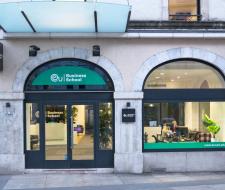Study international relations in Geneva 2026
- Admission Requirements to Study International Relations in Geneva
- Options for studying at the Faculty of International Relations in Geneva
- Benefits of Studying International Relations in Geneva for International Students
- Features of studying international relations at universities in Geneva for international students, including colleges and schools
- Career prospects for graduates of universities, colleges and schools with the study of international relations in Geneva
-
 7th Best Business Schools Switzerland
7th Best Business Schools Switzerland SwitzerlandGenevaCurrently watching: 3from 5850.00 CHF / semester
SwitzerlandGenevaCurrently watching: 3from 5850.00 CHF / semester -
 Top-50 best Marketing programs in the world
Top-50 best Marketing programs in the world SwitzerlandGenevaCurrently watching: 3from 0.00 CHF / semester
SwitzerlandGenevaCurrently watching: 3from 0.00 CHF / semester -
 10 Best universities for International Relations and Diplomacy in Switzerland
10 Best universities for International Relations and Diplomacy in Switzerland SwitzerlandGenevaCurrently watching: 2from 10968.00 € / year
SwitzerlandGenevaCurrently watching: 2from 10968.00 € / year -
 is one of the top universities in Geneva, Switzerland
is one of the top universities in Geneva, Switzerland SwitzerlandGenevaCurrently watching: 2from 11880.00 £ / year
SwitzerlandGenevaCurrently watching: 2from 11880.00 £ / year
International relations is a field of study that can acquaint everyone with the field of politics and the socio-historical impact of global development. During the courses, students will learn about the types of governance policies and political systems around the world, establish the relationship between these types and a wide range of international issues: global ethics, climate change, global poverty, human rights, and so on.
In today's world, international relations play an important role, because now even more than before, countries are interconnected with each other and often codependent. This sphere encompasses political, economic, social and environmental relations between sovereign countries, international institutions, non-governmental organizations, international corporations and government agencies at various levels. Understanding this complex area is crucial to understanding global issues, and the study of international relations provides valuable insight into the political, economic, and social dynamics shaping our world.
Geneva is a city of global importance, located on the shores of the largest lake in Europe. It is known as a center of diplomacy and is home to several international organizations: the United Nations, the World Trade Organization, the World Health Organization, the World Intellectual Property Organization, the International Organization for Standardization, and the Red Cross. In addition, Geneva is considered one of the financial capitals of Europe, which makes it an ideal place for international students to study.
International relations training programs at various institutions in Geneva are designed to help students develop communication skills that can be applied in different cultures. In addition to acquiring specialized knowledge based on intercultural approaches and theories, students studying international relations will develop the skills to:
- Analytical and research skills – for writing scientific and non-fiction papers,
- Communication skills – for effective communication in oral and written formats,
- Speaking and writing skills to speak in front of an audience in a variety of multicultural and social environments.
Graduates of international relations faculties and courses can apply all of these skills to many other industries and fields, even if they decide not to pursue a career in international relations.
Alternative destinations
Admission Requirements to Study International Relations in Geneva
Each educational institution in Geneva has its own individual requirements for applicants, but in most cases, some of the required documentation overlaps:
- A certified copy of a high school diploma (most often in English),
- Two passport-sized photographs,
- Curriculum vitae or resume,
- A letter of recommendation from representatives of the school administration or representatives of the political sphere of the region where the applicant studied or worked previously (usually in English),
- English language proficiency test – IELTS or TOEFL.
It is not uncommon for international relations applicants to write an entry essay on one of the topics provided, such as: "Describe your greatest achievement in any aspect of your life and the reasons for that success", "Choose a current issue of national or international importance that you believe will have an impact on society. Explain why."
Options for studying at the Faculty of International Relations in Geneva
The field of international relations is quite diverse and wide to study, so students wishing to study in Geneva can choose one of several directions. Examples of popular options:
- International Relations,
- Political Science
- Post-conflict justice and nation-building,
- International Economics,
- Humanitarian activities,
- In-depth studies in the field of European and International Management,
- International History,
- Digital International Relations and Diplomacy.
Benefits of Studying International Relations in Geneva for International Students
- Studying in Geneva provides graduates with ample opportunities to build a career in both public and private organizations. The knowledge and skills acquired allow them to work successfully in diplomatic missions, government structures, non-profit organizations, think tanks and international corporations.
- Students have the opportunity to undertake internships in the world's leading organizations located in Switzerland in general and in Geneva in particular.
- The study of international relations will allow future graduates to solve modern global problems. Our generations live in a time when society is facing a variety of problems, despite constant scientific discoveries and technological progress.
- Studying in Geneva is learning in the dynamic environment of Switzerland with a multicultural contingent of students and teachers from academia and international institutions, diplomatic services and field missions.
- Students develop a sense of social responsibility. Studying issues such as poverty, human rights violations, global health crises and inequality allows students to gain a deeper understanding of the most pressing problems facing the world.
- A degree in international relations provides a solid foundation that allows students to further specialize or pursue advanced degrees in a variety of fields: law, public policy, business administration, or regional studies.
Features of studying international relations at universities in Geneva for international students, including colleges and schools
- At the International Institute in Geneva, students have the opportunity to complete two bachelor's degrees simultaneously in three years: a Bachelor's degree in International Relations (IIG) and a Bachelor's degree in Business Management (Hons) awarded by the University of Plymouth (UK).
- The Geneva School of Diplomacy and International Relations offers students a unique learning methodology to improve analytical skills and use them to address today's most pressing issues (e.g., conflict resolution, global health, climate change, crisis management, and human rights). In addition, the school provides an opportunity to undergo internships in organizations such as WHO, UNITAR, the Permanent Mission of Malaysia to the UN, the Geneva International Center for Justice, UNESCO and so on.
- EU Business School in Geneva offers a Master's degree programme in International Relations, after which students can obtain an additional qualification, a UK-recognised diploma, at London Met.
In Geneva, educational institutions provide educational programs for all types of students. This applies not only to school and university graduates, but also to professionals from public, private and non-profit organizations seeking to improve their skills and advance their careers. Local schools, colleges and universities are culturally and discipline diverse, creating an intellectual and cultural environment conducive to the study of international relations and diplomacy. All educational programs in the field are designed to prepare future leaders who can effectively represent the interests of the world and promote peace and human rights on the world stage.
Career prospects for graduates of universities, colleges and schools with the study of international relations in Geneva
While a degree in international relations prepares graduates for political activity, it does not limit them to that. The abilities learned in this academic program are versatile and applicable to other fields. Therefore, those who specialize in international relations choose a variety of career paths. They may work in activism, national security, military research and assessment, and international business boundaries, among others. The interdisciplinary nature of international relations provides a strong foundation in problem solving and critical thinking. Graduates often find themselves well prepared to work in fields requiring strong analytical and communication skills. The curriculum emphasizes an understanding of global issues. This fosters the adaptability and broad-mindedness demanded by employers in a variety of industries.
Options for areas and professions in which graduates of the Faculty of International Relations can work:
- Diplomatic Service Officer,
- State Social Research Specialist,
- Intelligence Analyst,
- International Development Specialist,
- Political Risk Analyst,
- External Auditor,
- Public Relations Consultant,
- Radio Journalist,
- International Lawyer,
- Interpreter.
Cost of living in Geneva
| Expenses - USD/Month. | Min. | Med. |
|---|---|---|
| Accommodation | 825 | 1,028 |
| Food | 437 | 808 |
| Transportation | 56 | 273 |
| Communications and utilities | 127 | 150 |
| Clothing | 37 | 136 |
| Sports and leisure | 59 | 217 |
| Total | 1,541 | 2,612 |
Accommodation in Geneva
| Shared room outside of centre | 833 |
|---|---|
| Shared room in city centre | 1,039 |
| 1 bedroom apartment outside of centre | 1,163 |
| 1 bedroom apartment in city centre | 1,391 |
